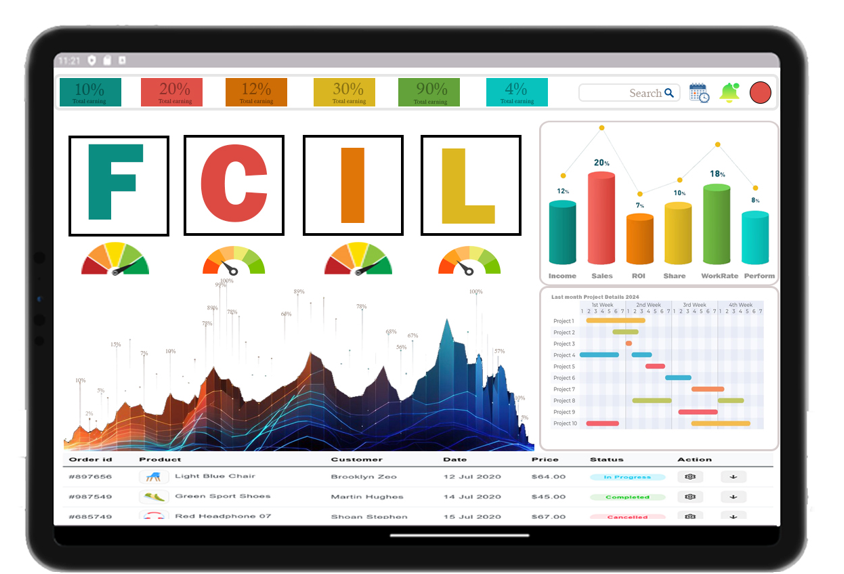In today’s competitive business landscape, organizations are increasingly recognizing the importance of performance measurement and strategic alignment. The Digital Balanced Scorecard (BSC) offers a robust framework that allows companies to translate their strategic goals into actionable objectives, fostering better decision-making and improved performance. This post explores several success stories from various industries, showcasing how the implementation of digital BSC software has transformed organizational performance.

1. Manufacturing: Enhancing Operational Efficiency
A large manufacturing company struggled to align its operational activities with its strategic goals. The traditional methods of performance measurement were cumbersome, relying heavily on spreadsheets and manual reporting, leading to delays and inaccuracies. By adopting Digital Balanced Scorecard (BSC) Software, the company achieved remarkable improvements:
- Real-time data access: The digital platform provided managers with instant access to key performance indicators (KPIs) across departments, allowing for timely adjustments and informed decision-making.
- Streamlined reporting: Automated reporting features reduced the time spent on data compilation, enabling teams to focus on analysis and action rather than manual entry.
- Increased accountability: The software allowed for the assignment of specific KPIs to individual team members, fostering a culture of accountability and performance ownership.
As a result, the manufacturer reported a 30% increase in operational efficiency within the first year, significantly enhancing their competitive position in the market.
2. Healthcare: Improving Patient Outcomes
In the healthcare sector, a regional hospital faced challenges in measuring the quality of patient care and aligning departmental goals with organizational objectives. The implementation of Digital Balanced Scorecard software revolutionized their approach to performance management:
- Comprehensive patient metrics: The BSC software enabled the hospital to track a wide range of metrics, including patient satisfaction, treatment outcomes, and operational efficiency.
- Cross-departmental collaboration: By visualizing goals and performance metrics, departments were encouraged to collaborate and share insights, leading to holistic improvements in patient care.
- Data-driven decision-making: The availability of real-time data empowered clinical leaders to make informed decisions about resource allocation and process improvements.
Within two years, the hospital saw a significant improvement in patient satisfaction scores and a reduction in readmission rates, demonstrating the positive impact of the Digital Balanced Scorecard.
3. Financial Services: Enhancing Strategic Alignment
A financial services firm with multiple divisions struggled to maintain strategic alignment across its operations. The reliance on disparate reporting systems led to inconsistencies and a lack of cohesive strategy. By implementing Digital Balanced Scorecard (BSC) Software, the organization experienced key benefits:
- Unified strategy: The BSC provided a centralized platform where all divisions could align their objectives with the overarching company strategy, fostering a unified approach to performance.
- Performance tracking: The software allowed for the continuous monitoring of financial and non-financial metrics, enabling the firm to identify trends and address issues proactively.
- Enhanced transparency: Stakeholders gained visibility into performance metrics, which improved communication and accountability at all levels of the organization.
As a result, the financial services firm reported a 25% increase in strategic goal attainment, illustrating the effectiveness of the Digital Balanced Scorecard (BSC) in driving organizational success.
4. Retail: Boosting Customer Experience
A national retail chain faced declining customer satisfaction and increasing competition. To address these challenges, they adopted Digital Balanced Scorecard software to better measure and enhance customer experience:
- Customer-centric metrics: The BSC allowed the retailer to define and track customer satisfaction metrics, including Net Promoter Score (NPS) and customer retention rates.
- Informed decision-making: With real-time insights into customer feedback and sales performance, store managers could make data-driven decisions to enhance service quality.
- Targeted training programs: The software helped identify areas where staff training was needed, enabling the company to implement targeted training programs that improved employee performance and customer interactions.
Within a year of implementing the BSC, the retailer saw a 15% increase in customer satisfaction scores and a noticeable improvement in sales performance.
5. Education: Aligning Academic Goals
A university seeking to enhance its academic performance and operational efficiency adopted Digital Balanced Scorecard software to align its strategic goals across departments:
- Academic performance tracking: The BSC enabled the university to monitor metrics such as graduation rates, student satisfaction, and faculty performance.
- Resource allocation: By visualizing performance data, academic leaders could allocate resources more effectively, focusing on areas that needed improvement.
- Stakeholder engagement: The software facilitated communication with stakeholders, including faculty, students, and alumni, promoting a collaborative approach to achieving the university’s strategic objectives.
As a result, the university improved its graduation rates by 10% and increased student satisfaction, demonstrating the value of the Digital Balanced Scorecard in the education sector.
Conclusion
The success stories presented here illustrate the transformative power of Digital Balanced Scorecard (BSC) Software across various industries. From manufacturing and healthcare to financial services, retail, and education, organizations are leveraging the BSC framework to enhance performance, align strategic objectives, and drive continuous improvement. As businesses navigate an increasingly complex environment, the Digital Balanced Scorecard remains an invaluable tool for fostering a culture of accountability and ensuring that strategic goals are met effectively.